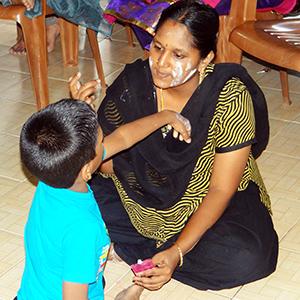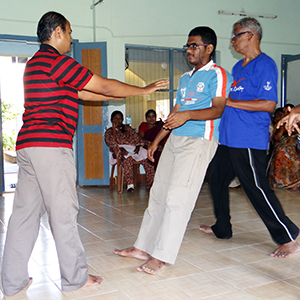
International Autism Awareness Day 2016 #autismawareness
Madurai based Velvi is one of the few organisations in the world, and probably the first in India, that has applied techniques of theatre and drama to address issues of autism. Dr Parasuram Ramamoorthi, the chairperson of and brain behind Velvi, shares its remarkable journey.
Your organization, Velvi, is an early adopter in India in applying drama to transform the lives of children and adults affected by Autism Spectrum Disorder (ASD). Can you tell us a little bit about the origins of Velvi and what is its philosophy?
Velvi is one of the few organisations in the world, and probably the first in India, that adapted Applied Drama to Autism. We started with using Drama in Mental health settings, prisons, and when we launched Applied Drama for Autism in 2005 many eye-brows were raised. It was then believed that children with Autism have no imagination or Imitation skills. Now, it is accepted widely in many countries.
Velvi was started for promoting art and theatre and preserving theatre traditions and we did work in that direction for nearly 7 years and we found that there were other organisations doing the same. But there was no organisation exclusively working for Autism and, so Velvi took the untrodden path of Drama for Autism. There is no going back now. We stopped all other activities and now focus only on Drama for Autism. Check our video below
Art can transform lives and life can become beautiful with Art. Theatre is about connecting with People and Velvi connects with People. This is our philosophy.
Velvi is an unusual name. What does it signify?
VELVI is a Tamil word that connotes a selfless action for the betterment of humanity. The word was suggested by one of the Trustees Dr A. Nirmala and all of us found it significant. All activities of Velvi are for a better world.
Velvi offers training programme in drama for people with autism. How was this programme developed and what are some of its benefits?
Velvi started with workshops for children with Autism on the use of Drama. The autism world identified (neurologists and special educators) three major deficits with children:
a) Poor or no eye-contact
b) Sensory issues
c) Communication difficulties.
We felt that theatre is a good medium to address these issues. We used theatre games and theatre techniques like Mask and face Mask to address these issues.
Children took to the mask without any force. Children started playing with other children. So eye-contact improved. Our experiment has shown that in 7 sittings a child’s eye-contact improved 100% and their attention span in any activity and sitting time increased from 5 seconds to 180 seconds.
Bonding between the child and the parent improved with the face mask. We have many anecdotes. A ten year old boy telling his mother: Mom you need a haircut at a Face mask session in USA; another child in Madurai told his mother: Amma your bindi is missing. Mothers were extremely happy that their children are looking at them intensely first time in their life.
Many games like running around, playing with sand, clay and listening to sounds helped them manage the sensory overload. Communication started happening when they looked at each other’s face. We stressed that where the eyes go there goes the Mind. We helped parents to communicate with their children through story- telling, games, animal masks and by pure sounds.
From children we moved on to young adults where the problems were different:
- Social skills
- Laughter and fun
- Independent life skills
- People skills
- Managing sexuality
These required different techniques like Rehearsing Life situations. We helped them rehearse every social situation they face: birthday party, marriage and funeral. Like a theatre actor they were trained to face such situations: how to dress up; how to greet guests and how to enjoy the party; how to behave in a funeral.
Drama and training in acting can ignite the mirror neurons and it is suspected that young persons with autism have dysfunctional mirror neurons or neuron-wiring is different in their case. We train them in facing situations involving the opposite sex; empathy is an important factor in dealing with people and particularly the opposite sex. Drama training and role–play can help in developing empathy. Similarly bonding can happen if oxytocin a hormone flows better and sufficient research has happened to prove that role- play can help in producing oxytocin.
Quite a lot of theatre training has gone into training young persons to face kife. We made several videos of our workshops. One of the issues the adults faced: bullying by strangers. That was difficult to handle and again theatre combats (mock fighting) and use of the voice helped.
The Velvi Art for Autism Festival has completed almost a decade and has evolved into a celebrated national and international event. What is the objective of hosting such a festival?
Velvi Art for Autism Festival started in 2006 and initially it was for children and it was day festival. Soon we realized that it has to be residential and found suitable venues for such festivals. Children and young adults participated in the festivals with one of their parents or care-takers. Nearly twenty children and ten young adults participated in every festival. We invited International experts like Andrew Nelson, Nikki Bettcher Ericksson, Rebecca Lytle, Josie Blagrave, Melissa Davies to work with children and young adults. The International experts worked hand in hand with Indian experts and our festivals also became a training ground for parents and special educators. Comedy training we felt is important and we invited Jameson Star and Naree Shields to train them in comedy and humour. The Festival is a living experience: living together, eating together, and playing together of nearly 30 families.
What are some of the highlights of the festival?
One big change that happened: They make friends in the Festival and continued their friendship even after the Festival.
We showcased their talents. Exhibition of their paintings and street concerts became part of the Festival. In the 2016 Festival we combined technology with art: Photoshop/design/flash for expressing their art. We also used Modelling and Photography as possible options for their career and training was given in these areas.
Related Articles on Art for Autism
There is music in everything I hear
What are some of the landmark achievements of Velvi?
Today Velvi is associated with Awesome Autism; what was once a painful term Autism, now we begin to see that Autism can be awesome too.
We started the Online Course Applied Drama for Autism. So far we have trained 200 parents/ special educators and therapists. We applied Theatre to some of the common problems of Autism in the course and these 200 people worked with one child or more than one child and so the methods have reached US, Middle East, Malaysia, Jordan, and many parts of India.
Velvi today offers hope to children with Autism.
You set up Velvi in way back in 1998. What has been your biggest learning experience from it?
As the Founder Trustee and Chairman of Velvi I have learnt that theatre can be a great tool of education: it is a life-changing art form. Personally I have learnt a structured way of living and learnt to have patience with children. I now am convinced that theatre includes all types of people, people with diverse views and talents.
To what extent has your organization helped in removing stigma attached to autism?
Awareness, acceptance and inclusion and attitudinal change towards education are the most important things required. Let us not teach “a fish to climb a tree”. Let us teach the fish to move from the pond to the river and then to the sea.
You have worked closely with issues related to autism. According to you, what do you think needs to be done by us in society to achieve greater inclusion and empowerment of children and adults with autism?
Let us tell the world that every child (disabled or not disabled) has a natural intelligence. Our education should identify that intelligence and nurture. No child is an idiot. Every child has some innate intelligence. (Multiple Intelligences by Howard Gardener) Let us accept them as they are and let our society be an Inclusive Society.
For more information, check out www.velvi.org. Also check out the videos below.







